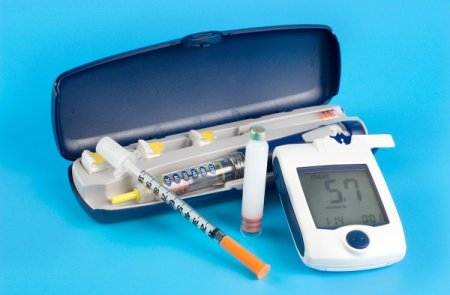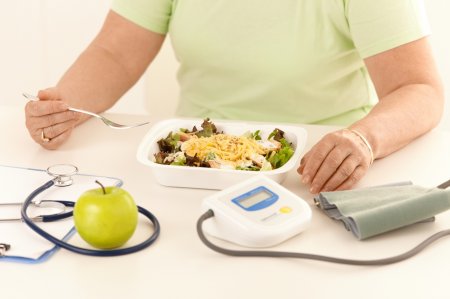Diabetes: Causes, Symptoms, types
Diabetes - a metabolic disorder in which reduced production of insulin by the pancreas hormone responsible for processing of glucose in the body.
As you know, normal life of any living being is impossible without the admission of energy. In order to be able vital processes, such as respiration, digestion, movement needed glucose which is produced from them of food in humans.
The food from the stomach into the intestine, converting it into glucose (sugar), and from there goes to krov.Chast glucose stored in the liver, muscle and adipose tissue as glycogen reserve - just in case when you need to maintain a normal blood sugar level.
Increase after meal blood sugar level is a signal for the start of pancreatic insulin - a hormone, whereby cells can receive energy from glucose. In diabetes the pancreas produces insulin is much less than necessary, so the cells can not assimilate glucose from the blood.
With the lack of development of insulin in the blood sugar level is getting higher, but at the same time starving cells and forced to take the energy of your own body fat. When the body starts to use its fat stores as an energy source, the patient's weight begins to decrease.
Normal blood sugar levels up to 6 mg / dL. When this figure is increased to 9.10 mmol / l, glucose begins to appear in the urine.
At the same time the urine lost a lot of water and mineral salts, and the patient has a strong thirst and frequent urination abundant.
Subsequently, in blood and urine comes acetone, which acts as a toxic substance organism.
The man begins to feel worse - begins to feel a constant weakness, fatigue, nausea and even vomiting. In addition, common symptoms of diabetes:
poor wound healing,
low resistance to infection,
slow recovery,
reducing body temperature,
cramps,
numbness and tingling in the extremities.
The following types of diabetes - the first type (insulin-dependent) and the second type (insulin-dependent).
Diabetes first type (insulin-dependent)
Type 1 diabetes most often affects children and young adults and is associated with the fact that the patient's body produces antibodies affecting own pancreatic cells which can not produce sufficient insulin.
This type of diabetes, unfortunately, at the current level of medicine is incurable and requires regular insulin injections. But by introducing into the body a daily dose of insulin, a person can lead a normal life and feel great, while still at the beginning of the last century, patients with diabetes mellitus of the first type have been doomed to suffer due to lack of drugs that could help them.
Diabetes Type II diabetes (non-insulin)
Type 2 diabetes often develops in people with excess weight after the age of 40 years and is considered a disease is not congenital and acquired, in which cells become insensitive to insulin.
Doctors call first measure to combat diabetes second type of weight reduction because:
obesity of the first degree of disease risk increases 3-fold,
at a second degree - 5 times,
while the third degree of obesity - 10 times.
Patients prescribed a diet that allows you to smoothly reduce weight to normal and keep it so for life. Very often only one normalization of weight and diet is enough to reduce the sugar to normal and eliminate the signs and symptoms of diabetes. In the case of the ineffectiveness of diet prescribed hypoglycemic pills, and only in extreme cases - insulin injections.
Diabetes mellitus: how to prevent.
Scientists believe that genetic predisposition, coupled with obesity and age over 40 years is the most significant cause of diabetes. Also, it can trigger the development of diseases of the pancreas, viral infections, and severe stress.
Contrary to popular belief, diabetes does not arise from the use of sweets. If a person is not a genetic predisposition to the disease, there is no excess weight and good physical activity, you can eat sweets.
If your close relatives diagnosed with diabetes, and the use of sweets you get obese, you are at risk of this disease. But just as at risk are those who do not consume sweets, but sedentary and obese from fast food, hamburgers, chips, and other sugary foods are not.
Some people are afraid that if they are close relatives of the sick in adulthood, they will not be able to avoid this disease. Doctors have long since debunked this myth, and argue that although the role of genetic factors in diabetes of the second type is high enough, with a normal weight, proper diet and sufficient physical activity to prevent diabetes is quite possible, because the risk of its development in this case, is extremely small.
Some people mistakenly think that they should be excluded from the menu carbohydrates and sugar immediately becomes normal. This is a dangerous misconception, because each person is vital to get food carbohydrates, because only they can get the glucose - the energy source for the body.
In order to avoid a sharp rise in blood sugar levels in the diet should be mainly medlennousvaivaemye carbohydrates - cereals, fruits and vegetables, which give a feeling of satiety, improves bowel function and output excess cholesterol.
A digestible carbohydrates such as sweets and sugary drinks should be excluded that there was no spike in blood glucose.
Excellent prevention of diabetes - physical activity promotes weight loss, the better the breakdown of fat and improve metabolism. Physical activity should be moderate, such a peaceful walk, because with significant physical exertion possible sharp drop in sugar and hypoglycemia development.
Scientists claim that the modern laboratory methods allow a very early stage to determine abnormalities in carbohydrate metabolism, as well as through preventive and curative measures to prevent the development of disease symptoms.

